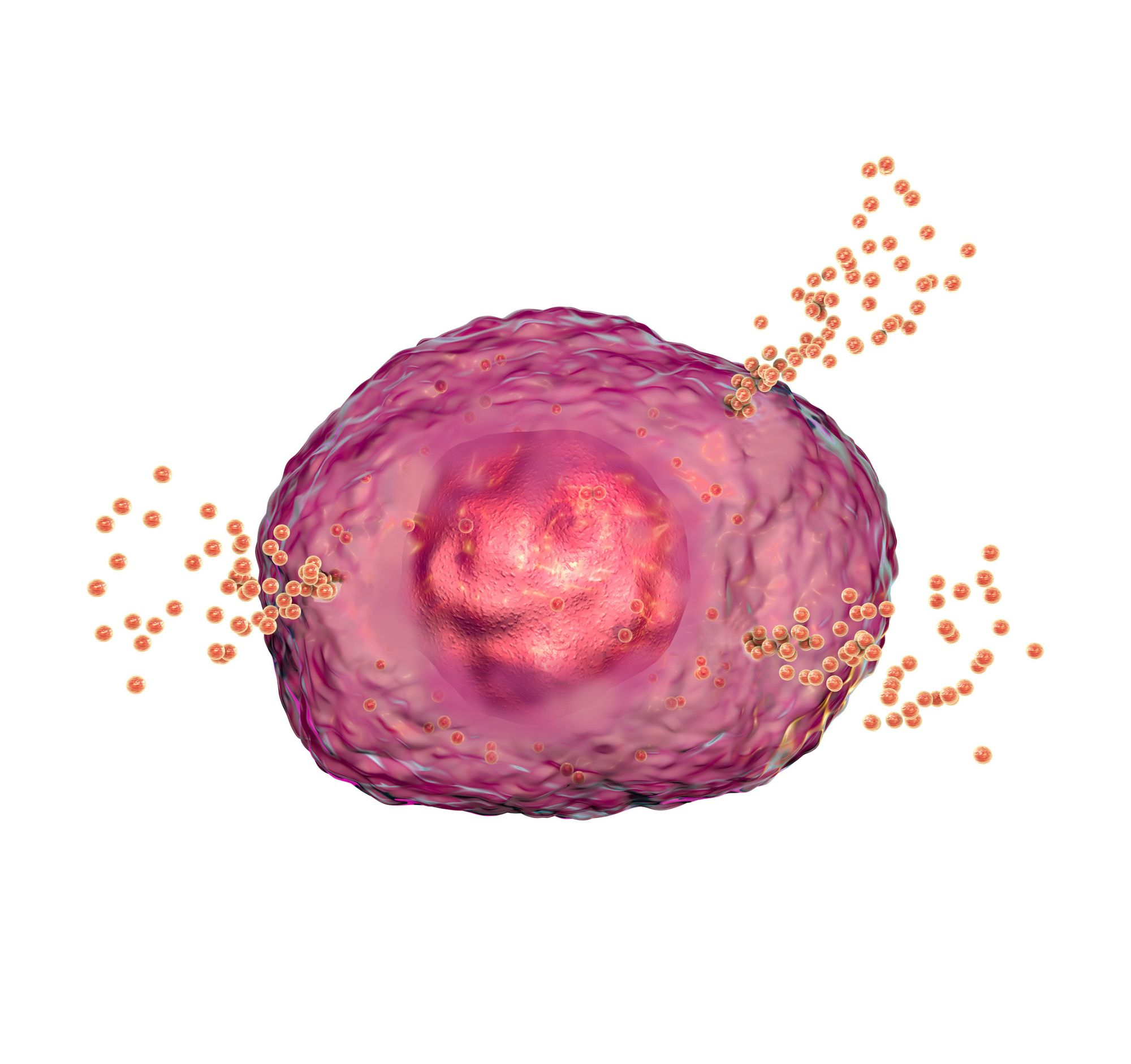

Welcome
Firstly, welcome to our website. We are a small charity called Mast Cell Action and are working hard to support people with MCAS or suspected MCAS and try to make life better for them. We provide lots of resources that can help people with managing their own MCAS and also run online sessions where people with MCAS can come together virtually. Living with MCAS can be really tough, and we hope that the information we provide will help you to navigate life with MCAS.

What are Mast Cells?
Everyone has special blood cells called 'mast cells' in all of their body parts. Their job is to help our bodies stay healthy, especially when something like an injury or an illness happens. When there's a problem, like a cut or a germ trying to make us sick, these mast cells release tiny chemical messengers called 'mediators.' Usually, this is a good thing because these mediators help our bodies fight off the bad stuff and make us feel better. Sometimes, in people with 'MCAS,' these mast cells get a little too active and they release the mediators more often than they should. When that happens, it can cause all sorts of symptoms in different parts of the body, making us feel unwell in many ways, all at once.

Triggers
If you're living with MCAS, you probably know that certain things can set off your symptoms. It's not always easy to figure out what's causing those reactions because there can be lots of triggers. To uncover what's causing your symptoms, it's a good idea to keep a diary. In this diary, jot down things like the foods you eat, any chemicals or fragrances you're exposed to, how stressed you are, changes in temperature, and your exercise routine. By doing this, you might start to notice patterns or things that seem to be connected to your reactions. You also need to be mindful of your surroundings. Some things like scented candles, perfumes, air fresheners and some cleaning products can set off your MCAS. Keeping your home free of these triggers can help a lot.
Also, don't go through this alone! Share your triggers and symptoms with your friends and family. They can help you manage and steer clear of your triggers. You got this!

Symptoms
Living with MCAS can be tough. It can bring a bunch of symptoms that can affect different parts of your body all at once. Sometimes, these symptoms can be mild for a while, and then suddenly get worse. It's like they have good days and bad days.
Sometimes, something specific can make the symptoms flare up, like a bad infection or a medical procedure. If you're going through this and the symptoms are getting to you, it's a good idea to talk to a doctor. They might be able to help.
It might also help to keep a diary of your symptoms so you can show it to your doctor and they can understand what's going on better. You could try using our Symptom Log.

Managing MCAS Yourself
Right now, there's no cure for MCAS, but the goal of treatment is to make the symptoms less severe and make life better. There are two main ways to manage the symptoms. First, there's what you can do yourself, and second, there are medicines. Usually, it's best to use both to control MCAS symptoms.
Avoiding things that make your MCAS worse is really important. If you know certain things, like certain foods, chemicals, exercise, or stress, make your symptoms worse, try to stay away from them as much as you can.
You might need to follow special diets, like a low histamine diet. Some people even have to combine a few diets, and that can be tricky. Always speak to a doctor or dietitian before making changes to your diet.
Figuring out what sets off your MCAS and what medicines to stay away from should be done with a doctor's help. A lot of people feel way better once they figure out their triggers and avoid them as much as possible.

Managing MCAS With Medicine
There are different medicines that can help with MCAS symptoms. Some make your mast cells relax and not react so much and others block the chemicals that mast cells release.
One thing that can make treatment tricky is that some medicines or the other ingredients in medications can actually be triggers for MCAS. Finding the right treatment can take some time and experiments with your doctor's guidance. Eventually, many people with MCAS find a way to manage it with medicine that works for them.

The Worry Hill
Living with MCAS can sometimes feel like having a bunch of worries piled up like a big mountain. The Worry Hill can help you deal with them one step at a time. Just like climbing a hill, it's about taking small steps to reach the top.
At the bottom of the hill are all your worries – things like managing symptoms, dealing with flare-ups, or explaining your condition to others. It might seem like a lot to handle all at once, so try to identify one worry to focus on. It could be the one that's bothering you the most right now or the one you feel ready to tackle first. Maybe it's finding ways to cope with symptoms during school or navigating social situations with friends.
Imagine yourself taking that first step up the hill. This step might be reaching out to your support system – whether it's a trusted friend, family member, or healthcare provider. Talking about your worries can lighten the load and make the climb feel a little easier.
As you start climbing, remember to take it one step at a time. You don't have to rush or push yourself too hard. Maybe one step for you is researching more about MCAS or learning new self-care techniques to manage symptoms.
It's okay to take breaks along the way. Rest when you need to, and don't be too hard on yourself. Each small step you take is a victory in itself, and it's all leading you closer to the top of the hill.
Eventually, you'll reach the top. From up there, your MCAS worries might not seem as overwhelming as they did before. You'll have gained a new perspective and a sense of strength and resilience.
Remember, you're not alone on this journey. There are people who care about you and want to support you every step of the way. So, the next time you're feeling weighed down by worries, think of yourself climbing that Worry Hill. You've got the strength to conquer it, one step at a time.

Emotional Support
Living with MCAS can be emotionally challenging at times, but you're not alone. Try to connect with others who understand what you're going through by joining online support groups.
You could also join our MCAS Young Voices group, to meet with other young people living with MCAS. Talk openly with friends and family about your feelings and experiences, and let them know how they can support you.
Remember to be kind to yourself and acknowledge that it's okay to have bad days. Give yourself permission to rest and recharge when needed. Challenge negative self-talk and replace it with positive affirmations.

Self Care Practices
It can help to make time to care for yourself whilst living with MCAS.
You might find it helpful to establish a relaxing bedtime routine and create a sleep-friendly environment free of distractions.
Limiting screen time before bed can also help, as exposure to blue light from electronic devices can interfere with sleep quality.
Make sure you're taking time to do things you enjoy, and be kind to yourself too!

Stay Positive and Resilient
Although it can be difficult sometimes, try to focus on the things in your life that bring you joy and fulfillment. Where possible, take part in activities that make you smile, whether it's spending time with loved ones, pursuing hobbies, or enjoying nature.
Have you tried practicing Mindfulness? Although not for everyone, mindfulness techniques such as deep breathing or meditation, can help reduce stress and anxiety, allowing you to approach challenges with greater clarity and resilience.
Lastly, always celebrate your achievements! Recognise and celebrate your accomplishments, no matter how small they may seem. Each step forward is a victory worth acknowledging. Surround yourself with positive affirmations and reminders of your strength and resilience.
You are not alone and you can do this!
Books
Relaxation and anti stress
The Anxiety Workbook for Teens by Lisa M. Schab - This workbook is designed to help teenagers understand and manage their anxiety through various exercises and activities.
The Relaxation and Stress Reduction Workbook for Kids by Lawrence E. Shapiro and Robin Sprague - Although aimed at kids, this book provides valuable relaxation techniques and stress reduction strategies suitable for teenagers.
Think good, feel good by Paul Stellard is a resource in print and on the internet for undertaking CBT with children and young people.
Your life, your way by Joseph V Ciarrochi PHD and Louise L Hayes PHD teaches us how to deal with all the changes and challenges of the teen years-and how to grow into the person you want to be.
The Anxiety Toolkit for Teens by Teen Thrive is one of the most teen-friendly anxiety books you will ever come across, that will give you the tools, practices, and strategies to address it head on.
Mast Cell and Chronic Illness
The Mast Cell Activation Syndrome (MCAS) Solution by Dr. Jill Carnahan - While not specifically aimed at young people, this book provides valuable information on MCAS, its management, and potential treatments.
Podcasts
Relaxation and anti stress
The Anxiety Coaches Podcast - Hosted by Gina Ryan, this podcast provides practical tips and advice for managing anxiety through mindfulness and other techniques.
Mast Cell and Chronic Illness
The Mast Cell Action Podcast - This podcast specifically addresses MCAS and provides information on how to manage it through interviews with experts and individuals living with the condition.
The Chronically Blonde Podcast - Hosted by Maddie Shively, this podcast explores the experiences of young adults living with chronic illnesses. It offers personal stories, advice, and a sense of community.
The Uninvisible Pod - This podcast, hosted by Lauren Freedman, features interviews with individuals who live with invisible chronic illnesses. It provides insights into their journeys, challenges, and coping strategies.
Vlogs and YouTube Channels
Relaxation and anti stress
Progressive Relaxation Meditation - Deborah Bircham is a Mast Cell Action Community Champion, as well as Mindfulness teacher and Holistic Health Coach,
Qigong Shorts - Qigong is a form of gentle exercise and moving meditation, with benefits to mental and physical health. Our YouTube channel provides a series of Qigong shorts for you to try.
Kati Morton- Kati is a licensed therapist who discusses various mental health topics, including anxiety, on her YouTube channel. Her videos are informative and easy to understand.
The Anxiety Guy - This YouTube channel offers videos on anxiety management techniques, including mindfulness exercises and coping strategies.
Tara Brach - Tara Brach's channel includes guided mindfulness and meditation practices that can help with anxiety.
Mast Cell and Chronic Illness
Chronically Jaquie - Jaquie shares her experiences living with multiple chronic illnesses, including EDS and POTS, on her YouTube channel. She provides insights into her daily life and offers advice for managing chronic conditions.
That's Inappropriate - While not exclusively focused on chronic illness, this channel, hosted by Meredith Masony, covers various aspects of parenting, including raising a child with a chronic illness. It can be relatable and informative for parents and young people alike.
Support Services
If you have or feel like you may hurt yourself, you can call 999 and ask for an ambulance or tell an adult you trust and ask them to call 999
Supports children, young people and families across England with emotional and practical care.
Practical information and emotional support for: Young people, young people leaving care and young carers. Provides local services for further support in some regions.
Campaign Against Living Miserably (CALM)
Information and support for anyone who is struggling with things and needs to talk. Offers a helpline and webchat.
A UK-wide database of mental health charities and organisations offering advice and support.
Local mental health services across England and Wales. Offers talking therapies, peer support and advocacy. Check to see if there is a Local Mind near you and what it can offer young people.
Information and advice on mental health and wellbeing for young people. Includes videos about dealing with change, social media and sleep.
Information, support and resources to help young people understand more about mental health and wellbeing. Search the Youth Wellbeing Directory to find services near you.
Self-help books to help people understand and manage their mental health and wellbeing. Also available in Welsh.
Mental health support for young people, parents and carers. Includes information about mental health problems and medication.
Advice and counselling network for young people. Includes a search tool for finding free local services.
03444 775 774
07537 416 905 (textline)
Advice, support and information for people who experience anxiety.
Provides support to young people experiencing panic attacks and obsessive-compulsive disorder (OCD). Offers a 6-week Youth Mentoring Scheme online or by phone.
Help and advice for young people experiencing suicidal feelings. Provides support and information for anyone worried about another young person.
116 123
0808 164 0123 (Welsh Language Line)
jo@samaritans.org
Samaritans are open 24/7 for people to talk about any concerns, worries and troubles they’re going through. You can visit some Samaritans branches in person.
85258 (textline)
Shout is a confidential and anonymous 24/7 text support service for anyone struggling to cope. It is free to text Shout from all major mobile networks in the UK. To speak to a trained volunteer, text SHOUT to 85258.
Resources
Provides access to their comprehensive library of free mental health resources, including leaflets, apps, videos and guides on a range of topics from Coronavirus advice to anxiety and depression.
Downloadable guides on a range of topics, including 'How to help a friend', 'School to college: managing the transition' and 'Five ways to better wellbeing'.
The Mix is the UK’s leading support service for young people. They are there to help you take on any challenge you’re facing - from mental health to money, from homelessness to finding a job, from break-ups to drugs. Talk to them via their online community, on social, through the free, confidential helpline or their counselling service.
Kooth is an online mental health community. Through their app you can read articles and tips from young people, join conversations on their discussion boards, chat to the team and keep a daily journal.
The Worry Hill is a theory used in behavioural therapy and it explains that when we are anxius, we elevate 'up' the worry hill. When we reach the top we reach our 'panic peak' before we start to coast back down to feeling normal. It can be a useful took in explaining anxious feelings to family and friends.
The Spoon Theory by Christine Miserandino - The "Spoon Theory" is a concept used by many with chronic illnesses to explain their limited energy and daily challenges. It's a helpful metaphor for understanding what it's like to live with a chronic condition.
Become a friend
Sign up to become a Friend of Mast Cell Action so we can keep you up to date on our progress and on how to get involved in our latest campaigns and initiatives.
Donate
Mast Cell Action relies entirely on the generosity of people like you. Please make a donation now and together we can make a difference to those affected by MCAS.







